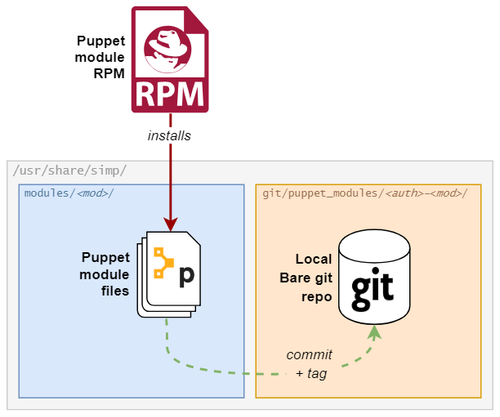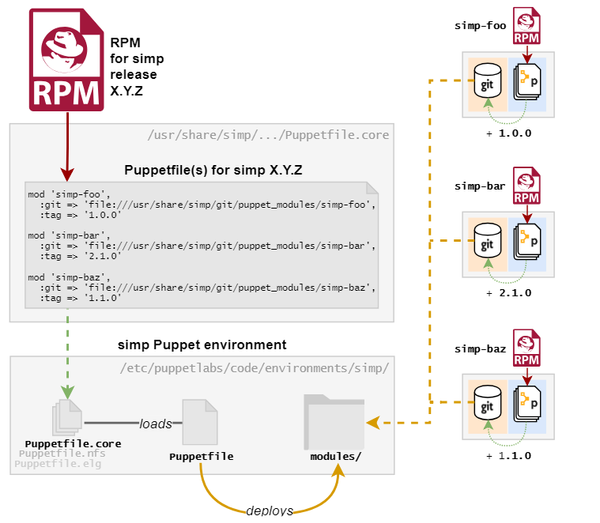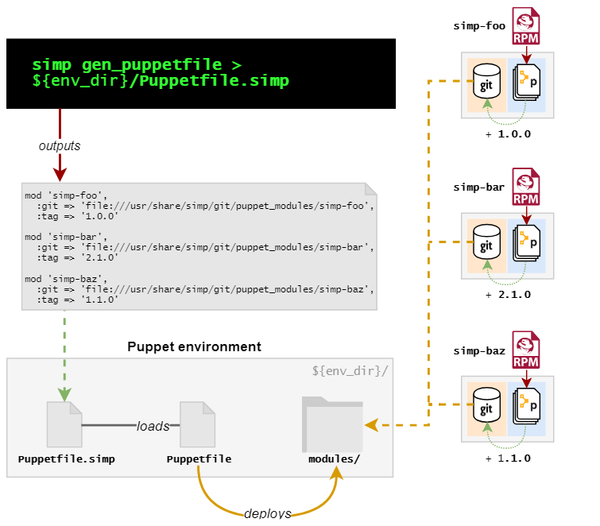| Info |
|---|
Add your comments directly to the page. Include links to any relevant research, data, or feedback. |
| Page Properties |
|---|
|
| Status | | Status |
|---|
| colour | Yellow |
|---|
| title | In progress |
|---|
|
|
|---|
| Impact | |
|---|
| Driver | |
|---|
| Approver |
|
|---|
| Contributors | Trevor Vaughan, Jeanne Greulich, Judith Johnson, Shark Bruhaha, Liz Nemsick, Michael Morrone, |
|---|
| Informed | Brandon Riden, Kendall Moore, Nick Markowski, Dylan Cochran, Steven Pritchard, Nick Miller, Adam Yohrling
|
|---|
| Due date | 05 April 2019 |
|---|
| Outcome | (Sprint 81 is tentatively proceeding with Option 1 + Option 2.5 as a stretch goal) |
|---|
|
| Info |
|---|
| This log records the results of Sprint 81 planning discussions as of 28 Feb 2019 and 08 Mar 2019. It will remain open for comment until 05 April 2019. |
...
- Early versions of SIMP: Puppet module RPMs installed directly into the master's
$modulepath. - SIMP 5.0(/4.2): To support Puppet environments, SIMP module RPMs installed with
Prefix: /etc/puppet/environments/simp/modules. On new installations, the simp/ environment directory was symlinked to production/. - SIMP 6.0: To accommodate environment deployment tools like r10k and Code Manager AND permit the original practice of installing directly into the environment directory where the Puppet Server could find them:
- Puppet module RPMs were modified to install into
Prefix: /usr/share/simp/modules - The
simp_rpm_helper script was introduced to centralize the logic for modules' RPM scriptlets- Under default conditions, the contents of just-installed Puppet module RPM would be immediately rsynced from
/usr/share/simp/modules/ to ${codedir}/environments/simp/modules/. - (This behavior depended on the configuration of
copy_rpm_data in /etc/simp/adapter_config.yaml, and various safety checks.)
- SIMP 6.4: (This decision log)
The
...
simp_rpm_helper script
Since the introduction of simp_rpm_helper in 6.0, the script's post-RPM management of ${codedir}/environments/simp/modules/ has been fraught with complications (not least being that most users don't know it's happening). Some RPM edge cases can have dangerous implications in the modules directory, particularly when upgrading obsoleted modules (SIMP-3895, SIMP-5331). Fixing or working around these problems (e.g., trigger scriptlets) can get intensely intricate, especially when combined with the tortuous RPM spec file logic inside simp-rake-helpers and its LUA and ERB assets.
...
| Option 1: Puppet module RPMs updates a local git repository | Option 2: (Includes Option 1) Maintain a reference Puppetfile(s) to use local git repositories |
|---|
Description | A local bare git repository is created for each Puppet module:

This is the most basic strategy, and implements the inital steps of an earlier r10k decision:
- When a SIMP-packaged Puppet module RPM is installed, the
simp_rpm_helper script will:
- ensure a local bare git repository exists at
/usr/share/simp/git/puppet_modules/<author>-<module>/ - push and tag a new commit each time a new RPM version of the module is installed
- Site admins who wish to manage their Puppet environments using r10k or Code Manager can reference the Puppet modules using the local repositories and tags.
- Tagged versions accumulate in the module's local git repository over time
| As module RPMs are installed, a reference Puppetfile(s) is kept up-to-date under /usr/share/simp/puppetfiles/:

The reference Puppetfile is modular, with separate SIMP-specific file(s) that can be easily replaced after new module RPMs are delivered. Here is a potential directory structure: ./ # Puppet environment directory, or /usr/share/simp/puppetfiles/current/
│
├── Puppetfile # top-level Puppetfile, includes other Puppetfiles (maintained by site admin)
└── Puppetfiles/ # contains Puppetfiles
├── site/ # the local site's Puppetfiles (maintained by site admin)
└── simp/ # SIMP vendored Puppetfiles. <-- COPY /usr/… UPDATES INTO ENVIRONMENT'S simp/
│ # after installing new RPM modules, the updated reference Puppetfiles
│ # can be copied into this directory:
├── Puppetfile.core # core SIMP modules
├── Puppetfile.extras.nfs # SIMP modules for NFS
├── Puppetfile.extras.gitlab # SIMP modules for Gitlab
└── ...The contents are automatically updated whenever SIMP-packaged module RPMs update their local git repos |
|---|
| Usage | - Installing a SIMP-packaged
pupmod-xxx-yyy RPM with the updated simp_rpm_helper script automatically triggers this behavior. - Git tags accumulate in each module's repository.
| - Initial setup by site admins:
- Site admins copy the contents of
/usr/share/simp/puppetfiles/current/ into their own Puppet environment directory (e.g., production). - Site admins create one or more Puppetfiles in
Puppetfiles/site. The set of Puppetfiles contain entries for all of their site-specific modules - Site admins update the top-level
Puppetfile to include their newly created Puppetfiles and the SIMP vendored Puppetfiles appropriate for their site.
- After the initial copy, site admins will:
- Continue editing their local copy of
Puppetfile and Puppetfiles/site/* - Update environments to the current (RPM-delivered) versions of all SIMP modules by simply replacing the local
simp/* with the contents of /usr/share/simp/puppetfiles/current/Puppetfiles/simp/* .
|
|---|
| Related Issues | | Jira Legacy |
|---|
| server | System JIRA |
|---|
| columns | key,summary,type,created,updated,due,assignee,reporter,priority,status,resolution |
|---|
| serverId | 45e63be1-2551-37a6-b050-86a38172f71d |
|---|
| key | SIMP-6192 |
|---|
|
| Jira Legacy |
|---|
| server | System JIRA |
|---|
| columns | key,summary,type,created,updated,due,assignee,reporter,priority,status,resolution |
|---|
| serverId | 45e63be1-2551-37a6-b050-86a38172f71d |
|---|
| key | SIMP-3948 |
|---|
|
| Jira Legacy |
|---|
| server | System JIRA |
|---|
| columns | key,summary,type,created,updated,due,assignee,reporter,priority,status,resolution |
|---|
| serverId | 45e63be1-2551-37a6-b050-86a38172f71d |
|---|
| key | SIMP-2942 |
|---|
|
| | Jira Legacy |
|---|
| server | System JIRA |
|---|
| columns | key,summary,type,created,updated,due,assignee,reporter,priority,status,resolution |
|---|
| serverId | 45e63be1-2551-37a6-b050-86a38172f71d |
|---|
| key | SIMP-6197 |
|---|
|
|
|---|
Pros and cons |  Immediately provides Puppetfile users with tagged git repos for each module Immediately provides Puppetfile users with tagged git repos for each module
 Does not require any external git hosting service Does not require any external git hosting service
 Works with network-isolated server installations Works with network-isolated server installations
 Allows switching modules that have the same name, but different author. This is not possible with SIMP 6.0.x - SIMP 6.3.x, because of RPM spec file bugs. Allows switching modules that have the same name, but different author. This is not possible with SIMP 6.0.x - SIMP 6.3.x, because of RPM spec file bugs.
 This option provides a separation between RPM files and Puppet environments This option provides a separation between RPM files and Puppet environments
 Puppet environments (and their modules) are no longer directly updated after SIMP RPM module upgrades Puppet environments (and their modules) are no longer directly updated after SIMP RPM module upgrades
- Non-r10k admins must manually copy the files for each module into the appropriate environment
- r10k admins must manually update Puppetfile for each RPM module to reflect the most current RPM installation.
 This could be mitigated by adding a legacy option to This could be mitigated by adding a legacy option to adapter_config.yaml that rsyncs the RPM-delivered files like SIMP 6.3—however: that has the double disadvantage of maintaining multiple behaviors for each scriptlet message in simp_rpm_helper and not addressing the systemic bugs in the legacy simp_rake_helper's logic (e.g., SIMP-3895, SIMP-5331)
|  Immediately provides a working Puppetfile that can deploy tagged modules using Immediately provides a working Puppetfile that can deploy tagged modules using r10k puppetfile install
 Simplifies the move to using control repositories and Simplifies the move to using control repositories and r10k environment deploy
 Site admins decide when/if/how to update their Puppetfiles, and in which environments Site admins decide when/if/how to update their Puppetfiles, and in which environments
 Reference Puppetfiles always deploys the current RPM-delivered versions of each module Reference Puppetfiles always deploys the current RPM-delivered versions of each module
 The The Puppetfiles/simp/ directory provides a simple place to drop updated SIMP Puppetfiles.
 This option encourages, but does not require (or provide) a git Control Repository. This option encourages, but does not require (or provide) a git Control Repository.
 This option expects site admins to use r10k/Code Manager to deploy modules (if not environments) This option expects site admins to use r10k/Code Manager to deploy modules (if not environments)
 Puppet environments (and their modules) are no longer directly updated after SIMP RPM module upgrades Puppet environments (and their modules) are no longer directly updated after SIMP RPM module upgrades
 Existing SIMP users that are not fluent on r10k will need documentation/support to allow them to take advantage of the Puppetfiles Existing SIMP users that are not fluent on r10k will need documentation/support to allow them to take advantage of the Puppetfiles
|
|---|
| Estimated cost | | |
|---|
| Option 2.5: (refines Option 2) Provide a simp command to generate a Puppetfile that uses local git repositories | Option 3: (Includes Option 1 + Option 2) Automatically create and maintain a local Control Repository |
|---|
Description | Provide a simp command for users to generate a Puppetfile |
o load the current on-demand. The Puppetfile will reference all RPM-installed Puppet modules from their tagged local git repositories:  Image Modified Image Modified
The reference Puppetfile loads a separate SIMP-specific Puppetfile.simp that can be easily replaced with the output of later simp gen_puppetfile runs: ./ # Puppet environment directory
│
├── Puppetfile # Environment's Puppetfile
| # (maintained by site admin, includes Puppetfile.simp)
└── Puppetfile.simp # Puppetfile of tagged modules from local SIMP git repos
# (generated by `simp gen_puppetfile`;
# tags match versions of currently-installed module RPMs) |
| Info |
|---|
This is currently no longer considered a viable option for SIMP 6.4.0. It is included here to documentation the fact that we considered it. |
The decision log "How to restructure the RPM installation sequence to be more r10k/Code Manager friendly" assumed that we would automatically provide a local bare git control repository. The intent was to provide a simple and safe experience for inexperienced Puppet administrators by automatically providing a local repository on their behalf.
However, after exploring different implementation options, it's not clear that this strategy would be simpler or safer. What has become clear is that most implementations are likely to add more trouble and complexity for site admins and SIMP developers than the idea is worth. |
| Usage | Initial setup by site admins: - Create/edit the target environment's
Puppetfile to include Puppetfile.simp - (This could automated as an option of
simp gen_puppetfile)
- Generate
Puppetfile.simp with simp gen_puppetfile > ${
|
environmentenv_dir}/Puppetfile.simp
After the initial copy, site admins |
will:Install new SIMP Puppet module RPMs new - a current
Puppetfile.simp with simp gen_puppetfile > ${
|
environment | N/A |
| Related Issues | | Jira Legacy |
|---|
| server | System JIRA |
|---|
| columns | key,summary,type,created,updated,due,assignee,reporter,priority,status,resolution |
|---|
| serverId | 45e63be1-2551-37a6-b050-86a38172f71d |
|---|
| key | SIMP-6197 |
|---|
|
| N/A |
Pros and cons |  Less magical and elaborate Less magical and elaborate
|
and magical than Option 2  Immediately provides a working Puppetfile that can deploy tagged modules using Immediately provides a working Puppetfile that can deploy tagged modules using r10k puppetfile install
 Site admins decide when/if/how to update their Puppetfiles, and in which environments Site admins decide when/if/how to update their Puppetfiles, and in which environments

|
Reference Generated Puppetfiles always |
deploys deploy the current RPM-delivered versions of each module  The The Puppetfiles/simp/ directory provides a simple place to drop updated SIMP Puppetfiles.
 Keeps Keeps simp_rpm_helper focused on its task of managing post-RPM local git repos
 This option encourages, but does not require (or provide) a git Control Repository. This option encourages, but does not require (or provide) a git Control Repository.
 This option expects site admins to use r10k/Code Manager to deploy modules (if not environments) This option expects site admins to use r10k/Code Manager to deploy modules (if not environments)
 Puppet environments (and their modules) are no longer directly updated after SIMP RPM module upgrades Puppet environments (and their modules) are no longer directly updated after SIMP RPM module upgrades
 Existing SIMP users that are not fluent on r10k will need documentation/support to allow them to take advantage of the Puppetfiles Existing SIMP users that are not fluent on r10k will need documentation/support to allow them to take advantage of the Puppetfiles
|  Sounds convenient when described at a high level Sounds convenient when described at a high level
 Likely to make too many assumptions Likely to make too many assumptions
 Requires the creation and maintenance of original tooling and logic. Requires the creation and maintenance of original tooling and logic.
 Nullifies the advantages of switching to community-supported deployment tools by adding a layer on top of them. Nullifies the advantages of switching to community-supported deployment tools by adding a layer on top of them.
 Makes control repo management complicated and brittle for both admins and SIMP development. Makes control repo management complicated and brittle for both admins and SIMP development.
 (Re-)confuses the separation between RPM-delivered files, SCM, control repositories, and local SIMP configurations. (Re-)confuses the separation between RPM-delivered files, SCM, control repositories, and local SIMP configurations.
 Proposals so far have tended to unwittingly re-engineer similar problems to the temporarily-obsoleted module upgrade dilemma that afflicts the original design of SIMP's simp-rpm-helper + module RPMs. Proposals so far have tended to unwittingly re-engineer similar problems to the temporarily-obsoleted module upgrade dilemma that afflicts the original design of SIMP's simp-rpm-helper + module RPMs.
 No matter what we build, it will be wrong for someone. No matter what we build, it will be wrong for someone.
|
| Estimated cost | | |
Action items
Outcome
(Working assumption for Sprint 81 as of 08 Mar 2019): Option 1 + Option 2.5 as a stretch goal
...


